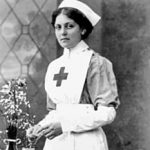
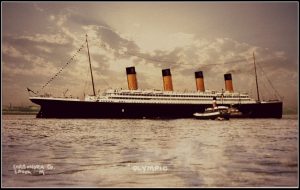 Travel by ship was not always a safe mode of travel. Things like icebergs, wars, storms, and seashores were known to bring to an end a voyage, that was otherwise very enjoyable. Most people remember the Unsinkable Molly Brown, who was really Margaret Tobin, mostly because of all the publicity and even a musical. Surviving the sinking of the Titanic, while an amazing feat, was something that 705 other people did too. The stories and musical were a way of remembering the tragedy. As amazing as surviving a ship sinking in those days was, there is something that is far more amazing!!
Travel by ship was not always a safe mode of travel. Things like icebergs, wars, storms, and seashores were known to bring to an end a voyage, that was otherwise very enjoyable. Most people remember the Unsinkable Molly Brown, who was really Margaret Tobin, mostly because of all the publicity and even a musical. Surviving the sinking of the Titanic, while an amazing feat, was something that 705 other people did too. The stories and musical were a way of remembering the tragedy. As amazing as surviving a ship sinking in those days was, there is something that is far more amazing!!
Surviving, not one, but three ship accidents in those days. In 1910, Violet Jessop began working as an ocean liner stewardess and nurse for the White Star line. She was on board when RMS Olympic sailed on September 20, 1911. The Olympic was a luxury ship that was the largest civilian liner at that time. Olympic left from Southampton and collided with the British warship HMS Hawke. There were no fatalities when Olympic sand, and despite damage, the ship was able to make it back to port without sinking. She doesn’t really count this one, because it didn’t sink, but then it did collide with another ship. She didn’t think that one was such an amazing feat, but I’d say that counts. Jessop was then a stewardess on the RMS Titanic April 10, 1912, when she was 24 years old. Four days later, on April 14, it struck an iceberg in the North Atlantic, a story with we all know very well. Titanic sank a little more than two hours after the collision. Jessop described in her memoirs how she was ordered up on deck, because she was to function as an example of how to behave for the non-English speakers who could not follow the instructions given to them. She watched as the crew loaded the lifeboats. She was later ordered into lifeboat 16; and as the boat was being lowered, one of the Titanic’s officers gave her a baby to look after. The next morning, Jessop and the rest of the survivors were rescued by the RMS Carpathia. According to Jessop, while on board the Carpathia, a woman, presumably the baby’s mother, grabbed the baby she was holding and ran off with it without saying a word. Records indicate that the only baby on boat 16 was Assad Thomas, who was handed to Edwina Troutt, and later reunited with his mother on the Carpathia. Then, during the First World War, she served as a stewardess for the British Red Cross. On the morning of November 21, 1916, she was on board the HMHS Britannic, that had been converted into a hospital ship, when it sank in the Aegean Sea due to an unexplained explosion. The Britannic sank within 57 minutes, killing 30 people. British authorities decided that the ship was either struck by a torpedo or hit a mine planted by German forces.
After the war, Jessop continued to work for the White Star Line, before joining the Red Star Line and then the 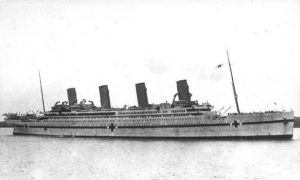
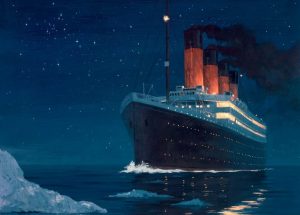 Royal Mail Line again. During her tenure with Red Star, Jessop went on two around the world cruises on that company’s largest ship, the Belgenland. In her late thirties, Jessop had a brief marriage, and in 1950 she retired to Great Ashfield, Suffolk, where my dad had been stationed during World War II. Jessop, often winkingly called “Miss Unsinkable,” died of congestive heart failure in 1971 at the age of 83.
Royal Mail Line again. During her tenure with Red Star, Jessop went on two around the world cruises on that company’s largest ship, the Belgenland. In her late thirties, Jessop had a brief marriage, and in 1950 she retired to Great Ashfield, Suffolk, where my dad had been stationed during World War II. Jessop, often winkingly called “Miss Unsinkable,” died of congestive heart failure in 1971 at the age of 83.
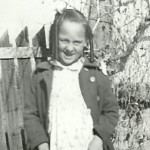
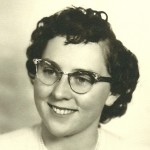 Some talents can be learned, but some tend to be things that you are just born with. I was watching a program the other day, and this couple was looking at a place to buy, and the husband mentioned that they could have a garden, and his wife said…”You can have a garden!!” He said, “Oh, because of your brown thumb.” I immediately thought of myself. A gardener I am not…and that is a fact. My husband’s aunt, Esther Hein, however, really likes to plant flowers and nurture them along. It is something that she has a talent for. I wish I did, but I was not born with that talent.
Some talents can be learned, but some tend to be things that you are just born with. I was watching a program the other day, and this couple was looking at a place to buy, and the husband mentioned that they could have a garden, and his wife said…”You can have a garden!!” He said, “Oh, because of your brown thumb.” I immediately thought of myself. A gardener I am not…and that is a fact. My husband’s aunt, Esther Hein, however, really likes to plant flowers and nurture them along. It is something that she has a talent for. I wish I did, but I was not born with that talent.
Aunt Esther also is a gifted artist and quilter. I have one of her paintings, and I really love it. Her quilting is well known, as is some of her sewing. She has made curtains and other such things for my father-in-law’s house, and I always liked knowing that those things came from Esther, with love. She made on particularly beautiful quilt for my father-in-law, that he loved so very much. It was always on their bed, and he was always extra careful to make sure that it was never harmed. Quilting is a beautiful art form, for those who are skilled enough to master it. Esther is, and again, I am not.
She also makes out a family calendar every year, with birthdays, death dates, and anniversary dates on it. It is  an act of love that she has done for many years for her family members. I remember looking at the calendar she sent to my father-in-law every year. The calendar had birthday and death date of people long passed, and was a great ancestry tool, as well as a way to keep up with important dates, and remember those long passed. Esther is active in her church, and loves the Lord, and she loves to play with her dogs, go camping, and snow shoeing, as well as traveling. We don’t get to see Esther as much as we would like, and we hope that maybe one of these days, her travels with bring her to Wyoming again. Of course, I suppose we should make our travels include Oregon too. Today is Esther’s birthday. Happy birthday Esther!! Have a great day!! We love you!!
an act of love that she has done for many years for her family members. I remember looking at the calendar she sent to my father-in-law every year. The calendar had birthday and death date of people long passed, and was a great ancestry tool, as well as a way to keep up with important dates, and remember those long passed. Esther is active in her church, and loves the Lord, and she loves to play with her dogs, go camping, and snow shoeing, as well as traveling. We don’t get to see Esther as much as we would like, and we hope that maybe one of these days, her travels with bring her to Wyoming again. Of course, I suppose we should make our travels include Oregon too. Today is Esther’s birthday. Happy birthday Esther!! Have a great day!! We love you!!
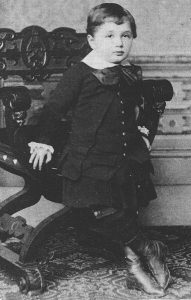 Albert Einstein has always been one of my favorite historic figures, so I decided to look for more information on him. I was surprised about some of the things I found out. Albert Einstein was born in Ulm, Germany in 1879, to parents Hermann Einstein and Pauline Einstein. Albert had a large head at the time he was born, so large, in fact that it startled his mother and grandmother when they saw him for the first time. The “fat” head slowly receded and turned into a normal size. Strangely, the head containing the brain of an amazing historic genius, was not so perfect at birth. Einstein did not speak until the age of three, odd for a genius. He revealed this fact about himself in his biography. Today there is a term, “Einstein Syndrome,” which was coined by Dr. Thomas Sowell, to describe exceptionally bright people whose speech is delayed. Einstein spent his teenage years in Munich, where his family operated an electrical equipment business. Galileo Galilei was Einstein’s favorite scientist.
Albert Einstein has always been one of my favorite historic figures, so I decided to look for more information on him. I was surprised about some of the things I found out. Albert Einstein was born in Ulm, Germany in 1879, to parents Hermann Einstein and Pauline Einstein. Albert had a large head at the time he was born, so large, in fact that it startled his mother and grandmother when they saw him for the first time. The “fat” head slowly receded and turned into a normal size. Strangely, the head containing the brain of an amazing historic genius, was not so perfect at birth. Einstein did not speak until the age of three, odd for a genius. He revealed this fact about himself in his biography. Today there is a term, “Einstein Syndrome,” which was coined by Dr. Thomas Sowell, to describe exceptionally bright people whose speech is delayed. Einstein spent his teenage years in Munich, where his family operated an electrical equipment business. Galileo Galilei was Einstein’s favorite scientist.
Albert Einstein’s lifelong love of science and math is no big secret, and in fact is what made him famous, that and his well know genius. That said, I was stunned to find out that his teachers did not  consider him a good student, and they refused to recommend him for further employment. It is said that at 16, Einstein failed an exam that would have allowed him train to become an electrical engineer. One of the things I found to be the most interesting is that Albert Einstein had a poor memory. He could not remember names, dates or phone numbers. I heard that he didn’t see the need to remember what he could have written down. Maybe this was why it needed to be written down. Most people know that he was given the Nobel Prize in 1921. It was the Nobel Prize in Physics that was awarded to Albert Einstein “for his services to Theoretical Physics, and especially for his discovery of the law of the photoelectric effect.” But, Einstein had a funny side too, and would have fit right in with the kids of today…at least in his picture taking. I really it wasn’t a selfie, but as selfies go, it fit right in with that the kids of today are doing, and apparently he though it was just as funny as they do. He was sure pleased with this one.
consider him a good student, and they refused to recommend him for further employment. It is said that at 16, Einstein failed an exam that would have allowed him train to become an electrical engineer. One of the things I found to be the most interesting is that Albert Einstein had a poor memory. He could not remember names, dates or phone numbers. I heard that he didn’t see the need to remember what he could have written down. Maybe this was why it needed to be written down. Most people know that he was given the Nobel Prize in 1921. It was the Nobel Prize in Physics that was awarded to Albert Einstein “for his services to Theoretical Physics, and especially for his discovery of the law of the photoelectric effect.” But, Einstein had a funny side too, and would have fit right in with the kids of today…at least in his picture taking. I really it wasn’t a selfie, but as selfies go, it fit right in with that the kids of today are doing, and apparently he though it was just as funny as they do. He was sure pleased with this one.
One of the most interesting things I found out was that Einstein was offered the opportunity to become  president of Israel after the its first president died in 1952. Einstein politely refused the offer, saying that he did not have the natural aptitude and experience to deal with people properly. He said that he could only understand a little of science and none of human nature. A little of science!!! Really!! I suppose that a genius would know and realize that just like the Bible, our understanding of science has only scratched the surface. Sadly, Albert Einstein had a “practical” view, if you will, of human life. He could have lived longer than he did. But, before he died, doctors suggested surgery to Einstein, because he suffered from a burst blood vessel. However, Einstein refused, stating, “It is tasteless to prolong life artificially.” I don’t understand why he ended such brilliance by refusing an operation that could save him. I find that very sad.
president of Israel after the its first president died in 1952. Einstein politely refused the offer, saying that he did not have the natural aptitude and experience to deal with people properly. He said that he could only understand a little of science and none of human nature. A little of science!!! Really!! I suppose that a genius would know and realize that just like the Bible, our understanding of science has only scratched the surface. Sadly, Albert Einstein had a “practical” view, if you will, of human life. He could have lived longer than he did. But, before he died, doctors suggested surgery to Einstein, because he suffered from a burst blood vessel. However, Einstein refused, stating, “It is tasteless to prolong life artificially.” I don’t understand why he ended such brilliance by refusing an operation that could save him. I find that very sad.
 The Christmas rush is behind us for another year. The gifts are purchased, and wrapped, and for many people, already opened. Christmas dinner is being prepared and families are gathering together. The house is filled with laughter and conversation and stomachs are growling just a bit as the aroma of the turkey fills the air. It’s hard to wait for the meal to be ready. It’s such a wonderful time to be sharing with family. Many people think of these big dinners as a lot of work, and it can be almost a relief to have them over, but really, they are a gift. All to quickly, children grow up and sometimes, move away, and before you can even blink, everything has changed. All the more reason to cherish the times you have, while you have them.
The Christmas rush is behind us for another year. The gifts are purchased, and wrapped, and for many people, already opened. Christmas dinner is being prepared and families are gathering together. The house is filled with laughter and conversation and stomachs are growling just a bit as the aroma of the turkey fills the air. It’s hard to wait for the meal to be ready. It’s such a wonderful time to be sharing with family. Many people think of these big dinners as a lot of work, and it can be almost a relief to have them over, but really, they are a gift. All to quickly, children grow up and sometimes, move away, and before you can even blink, everything has changed. All the more reason to cherish the times you have, while you have them.
So much has changed since the Christmases of my youth, and while I wouldn’t go back, because then I wouldn’t have my precious daughters, sons-in-law, grandchildren, and now the new little great grandbaby that is on the way in late spring 2018. But, I do wish my parents, Allen and Collene Spencer 
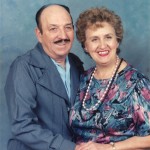 were still here. Having them in Heaven brings a little bit of a melancholy feeling to an otherwise cheerful season. Nevertheless, knowing that they are spending their days in Heaven with Jesus…the reason for this season, makes me feel very happy for them, even if I’m sad for me. It has been 10 Christmases since I have seen my dad, and 3 Christmases since I’ve seen my mom, as well as, 5 Christmases since I’ve seen my father-in-law, Walt Schulenberg. It’s odd, I suppose to think of how many Christmases they have been gone, but they were such a big part of what Christmas was for me, as well as every day of my life, that I find it really hard not to contemplate the fact that so much has changed in the years since they left, and just how much we miss them.
were still here. Having them in Heaven brings a little bit of a melancholy feeling to an otherwise cheerful season. Nevertheless, knowing that they are spending their days in Heaven with Jesus…the reason for this season, makes me feel very happy for them, even if I’m sad for me. It has been 10 Christmases since I have seen my dad, and 3 Christmases since I’ve seen my mom, as well as, 5 Christmases since I’ve seen my father-in-law, Walt Schulenberg. It’s odd, I suppose to think of how many Christmases they have been gone, but they were such a big part of what Christmas was for me, as well as every day of my life, that I find it really hard not to contemplate the fact that so much has changed in the years since they left, and just how much we miss them.
While the commercialized part of Christmas is about giving and receiving gifts from loved ones, it is the  ultimate gift that really is what Christmas is all about. I don’t know what other people think about gift giving, but for me, it is God’s children imitating the Father. God gave us the ultimate gift, when He sent His son, and Jesus gave us the ultimate gift when He gave His life for us. We can never give a gift that could begin to compare to the precious gift that God gave us, but it is a show of our love for each other, and I know that makes God happy. He wanted His children to love each other, just as He so loved the world. I’m thankful for the coming of our Lord and Saviour, Jesus Christ, and for the price He later paid, because without Him none of us would receive Heaven when we passed away. That you Father for your precious gift, and thank you Jesus for paying my debt. Happy birthday Jesus. We love you!!
ultimate gift that really is what Christmas is all about. I don’t know what other people think about gift giving, but for me, it is God’s children imitating the Father. God gave us the ultimate gift, when He sent His son, and Jesus gave us the ultimate gift when He gave His life for us. We can never give a gift that could begin to compare to the precious gift that God gave us, but it is a show of our love for each other, and I know that makes God happy. He wanted His children to love each other, just as He so loved the world. I’m thankful for the coming of our Lord and Saviour, Jesus Christ, and for the price He later paid, because without Him none of us would receive Heaven when we passed away. That you Father for your precious gift, and thank you Jesus for paying my debt. Happy birthday Jesus. We love you!!
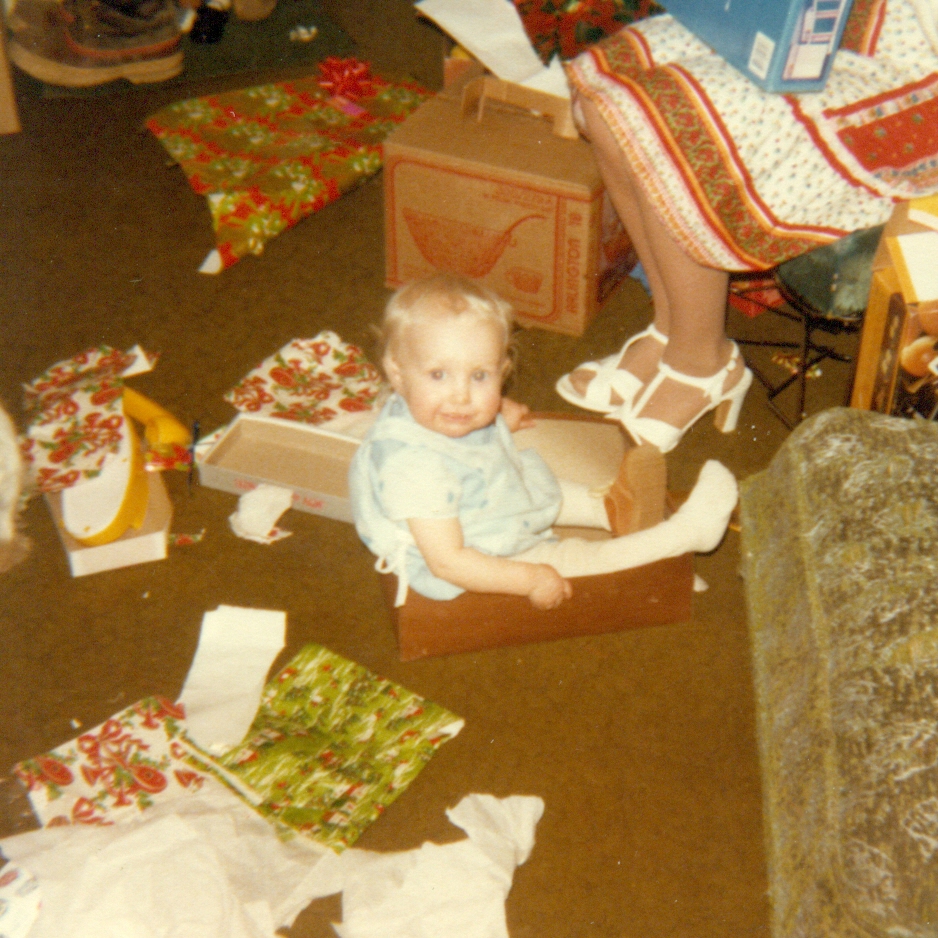

 Christmas Eve traditions can vary from family to family. My husband, Bob’s family always got together for a chili dinner on Christmas eve. Then they opened the presents, and the kids spent the rest of the evening playing with their new toys while all the parents sat around visiting. Sometimes Santa Clause would even show up, which was always a big hit among the little ones. Christmas morning was a day to relax and for the kids to play, while their parents prepared the huge Christmas dinner, and after dinner, all you could think of was how badly you wanted to lay down and sleep…especially when you had eaten two such dinners that day. Christmas dinner was just that way. It really should be followed with a nice long nap, stretched out on the couch to give the belly room.
Christmas Eve traditions can vary from family to family. My husband, Bob’s family always got together for a chili dinner on Christmas eve. Then they opened the presents, and the kids spent the rest of the evening playing with their new toys while all the parents sat around visiting. Sometimes Santa Clause would even show up, which was always a big hit among the little ones. Christmas morning was a day to relax and for the kids to play, while their parents prepared the huge Christmas dinner, and after dinner, all you could think of was how badly you wanted to lay down and sleep…especially when you had eaten two such dinners that day. Christmas dinner was just that way. It really should be followed with a nice long nap, stretched out on the couch to give the belly room.
As a little girl, Christmas eve was a time when we got to open one gift…always pajamas…which ensured good pictures on Christmas morning. We spent time singing Christmas carols. Our Christmas gifts were opened on Christmas morning. I think I always liked that way better, because the anticipation continued to build all night, and then we still had to wait for Mom and Dad to wake up and get things going in the morning. Of course, we really had no idea that they were awake before we were. I think they were just as excited as we were. When it came to Christmas, they were big kids too.
For my grandparents, Hattie and George Byer, as well as my niece, Raylynn Williams and her husband, Doug, 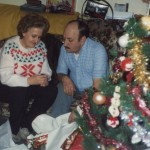

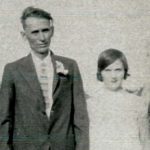 Christmas Eve meant celebrating their wedding anniversary. For Grandma and Grandpa, a Christmas Eve wedding was probably more a matter of having family already gathered, and a wedding being held so people didn’t have to travel twice. For Raylynn, getting married on Christmas Eve was a way of honoring her grandparents…a way of sharing something special with them, even though they were both in Heaven by the time she married. It was like having them there at the wedding, and I’m sure that was exactly what Raylynn was thinking as she planned her special day.
Christmas Eve meant celebrating their wedding anniversary. For Grandma and Grandpa, a Christmas Eve wedding was probably more a matter of having family already gathered, and a wedding being held so people didn’t have to travel twice. For Raylynn, getting married on Christmas Eve was a way of honoring her grandparents…a way of sharing something special with them, even though they were both in Heaven by the time she married. It was like having them there at the wedding, and I’m sure that was exactly what Raylynn was thinking as she planned her special day.
Our daughter Corrie Petersen, her husband, Kevin, and their kids like the tradition we have of opening one gift, and then the rest on Christmas morning, and they have the added excitement of going to Kevin’s mom’s after our house. It really keeps them hopping. Our daughter, Amy Royce, her husband, Travis, and their kids like to watch a movie while eating cheese and sausage with crackers after the gifts are opened on Christmas Eve. For Bob and me…after the rush of Christmas Eve chili with the Schulenberg family, and of everyone coming for the traditional Christmas Eve gift opening session, it’s time to sit down and relax a while before everything starts in the morning, because Christmas dinner is held at our house now. Since my sisters, our families, and I have a party a week or so early, like the Byer family, we all spend Christmas with our own families now. With my 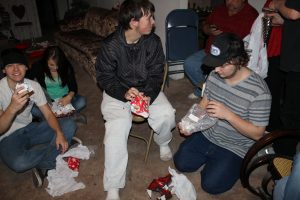
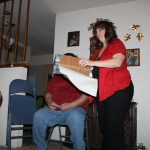
 parents in Heaven, the big day shifted to us. We love having everyone share it with us. Traditions change as families change, and it will continue to change in the future. The main thing is to enjoy the tradition, while remembering the reason for the season, the birth of our Lord, Jesus Christ.
parents in Heaven, the big day shifted to us. We love having everyone share it with us. Traditions change as families change, and it will continue to change in the future. The main thing is to enjoy the tradition, while remembering the reason for the season, the birth of our Lord, Jesus Christ.
 As people prepare for Christmas, their days are busy shopping for gifts, and buying things for Christmas dinner. Their minds are on friends, family, and the coming holiday…not disaster. On December 23, 1982, disaster came in the form of a chemical…dioxin, which had been sprayed on the unpaved roads in the town of Times Beach, Missouri. On the 23rd, just two days before Christmas the Missouri Department of Health and the federal Centers for Disease Control (CDC) informed the residents that their town would have to be evacuated. They were told that not only would their town have to be evacuated, but it would also have to be demolished. It was a nightmare Christmas for the people of the town of about 2,000 people. These were their homes, and now the government was telling them that they had to leave. Sure they were offered money, and a chance to relocate somewhere, but some of the residents had lived there all their lives. They just didn’t want to leave. Some refused to sell. By February, the federal and state governments had spent $36 million to buy every house in town except one. Eventually, in 1985, there was only one couple left living in the town, George and Lorene Klein. People magazine profiled their last stand. “They wanted more money,” Leistner says. “She still blames me. I didn’t set the price, but it’s my fault. She doesn’t speak to me.” In 1985, the city was officially disincorporated.
As people prepare for Christmas, their days are busy shopping for gifts, and buying things for Christmas dinner. Their minds are on friends, family, and the coming holiday…not disaster. On December 23, 1982, disaster came in the form of a chemical…dioxin, which had been sprayed on the unpaved roads in the town of Times Beach, Missouri. On the 23rd, just two days before Christmas the Missouri Department of Health and the federal Centers for Disease Control (CDC) informed the residents that their town would have to be evacuated. They were told that not only would their town have to be evacuated, but it would also have to be demolished. It was a nightmare Christmas for the people of the town of about 2,000 people. These were their homes, and now the government was telling them that they had to leave. Sure they were offered money, and a chance to relocate somewhere, but some of the residents had lived there all their lives. They just didn’t want to leave. Some refused to sell. By February, the federal and state governments had spent $36 million to buy every house in town except one. Eventually, in 1985, there was only one couple left living in the town, George and Lorene Klein. People magazine profiled their last stand. “They wanted more money,” Leistner says. “She still blames me. I didn’t set the price, but it’s my fault. She doesn’t speak to me.” In 1985, the city was officially disincorporated.
Originally founded in 1925, Times Beach was actually part of a newspaper promotion: A 6-month subscription  to The St. Louis Times plus an extra $67.50 bought a 20-by-100–foot lot along an unsettled stretch of the Meramec River. The town never became the booming resort that the newspaper had intended it to be, but rather, it evolved into a lower-middle–class hamlet of about 2,000 people. It was located just off Route 66, the now famous two lane highway that ran from Chicago to Los Angeles, and was once was one of the major routes across the American Southwest. Unfortunately, being the small town that it was, Times Beach never had the money to pave its roads, and all the dust that was kicked up by vehicles was a real nuisance. In 1972, town officials thought they’d found a perfect solution to the problem: they paid local waste-hauler Russell Bliss just 6 cents per gallon to spray its roads with oil. The plan was to basically glue the dust to the ground, but we all know about the best laid plans. They had hoped the oil mixture would mix with the dirt and somehow glue it down. They never anticipated the problem the “cheaper solution” would cause.
to The St. Louis Times plus an extra $67.50 bought a 20-by-100–foot lot along an unsettled stretch of the Meramec River. The town never became the booming resort that the newspaper had intended it to be, but rather, it evolved into a lower-middle–class hamlet of about 2,000 people. It was located just off Route 66, the now famous two lane highway that ran from Chicago to Los Angeles, and was once was one of the major routes across the American Southwest. Unfortunately, being the small town that it was, Times Beach never had the money to pave its roads, and all the dust that was kicked up by vehicles was a real nuisance. In 1972, town officials thought they’d found a perfect solution to the problem: they paid local waste-hauler Russell Bliss just 6 cents per gallon to spray its roads with oil. The plan was to basically glue the dust to the ground, but we all know about the best laid plans. They had hoped the oil mixture would mix with the dirt and somehow glue it down. They never anticipated the problem the “cheaper solution” would cause.
Bliss got the oil for free the year before, when a chemical manufacturer that had made most of its money selling napalm to the military paid him to get rid of its waste materials. He mixed six truckloads of that waste…which turned out to be hexachlorophene tainted with dioxin, a dangerous chemical that, once absorbed, can remain in the human body for more than 10 years–with a tankful of used motor oil. Next, he sprayed this carcinogenic cocktail all over town. The children of Times Beach loved sliding around in Bliss’ purple-tinted goo, 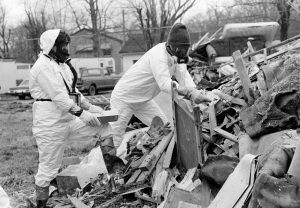 and no one gave the substance a second thought until animals…particularly horses, who had contact with Bliss-sprayed roads and barn floors and riding rings every day, all year round…started dropping dead. Soon people started to get sick, too. In 1979, the EPA came to town and took soil samples, and in 1982 the agency announced that the levels of dioxin, “the most potent cancer-causing agent made by man,” in Times Beach were off the charts. The agency evacuated the town just after Christmas. In all, the agency spent $250 million and incinerated 265,000 tons of dioxin-tainted soil. In 1999, the bulldozed and cleaned-up Times Beach reopened as the Route 66 State Park. Times Beach has remained a Ghost Town since that time.
and no one gave the substance a second thought until animals…particularly horses, who had contact with Bliss-sprayed roads and barn floors and riding rings every day, all year round…started dropping dead. Soon people started to get sick, too. In 1979, the EPA came to town and took soil samples, and in 1982 the agency announced that the levels of dioxin, “the most potent cancer-causing agent made by man,” in Times Beach were off the charts. The agency evacuated the town just after Christmas. In all, the agency spent $250 million and incinerated 265,000 tons of dioxin-tainted soil. In 1999, the bulldozed and cleaned-up Times Beach reopened as the Route 66 State Park. Times Beach has remained a Ghost Town since that time.

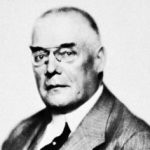 The process of trying to end a war and bring peace between nations is a tricky one, and one that can end up being highly volatile, or even explode into further fighting!! The world was in the midst of World War I, and an armistice had been signed between Russia and Germany. The Soviet government had requested peace negotiations on Nov. 8, 1917. They began on December 22, 1917, nearly three weeks after a ceasefire was declared on the Eastern Front. Representatives of the two countries began peace negotiations at Brest-Litovsk, near the Polish border in what is now the city of Brest, in Belarus. They were divided into several sessions. During this time, the Soviet delegation tried to prolong the proceedings, so they could take full advantage of the opportunity to issue propaganda statements. Meanwhile, the Germans grew increasingly impatient with the delays.
The process of trying to end a war and bring peace between nations is a tricky one, and one that can end up being highly volatile, or even explode into further fighting!! The world was in the midst of World War I, and an armistice had been signed between Russia and Germany. The Soviet government had requested peace negotiations on Nov. 8, 1917. They began on December 22, 1917, nearly three weeks after a ceasefire was declared on the Eastern Front. Representatives of the two countries began peace negotiations at Brest-Litovsk, near the Polish border in what is now the city of Brest, in Belarus. They were divided into several sessions. During this time, the Soviet delegation tried to prolong the proceedings, so they could take full advantage of the opportunity to issue propaganda statements. Meanwhile, the Germans grew increasingly impatient with the delays.
The leader of the Russian delegation was Leon Trotsky, the Bolshevik People’s Commissar for Foreign Relations. Max Hoffmann, the commander of German forces on the Eastern Front, served as one of the chief negotiators on the German side. The main difference of opinion in Brest-Litovsk was over the surrender of Russian land to the Germans. The Russians demanded a peace agreement without annexations or indemnities and the Germans were unwilling to concede on this point. In February 1918, Trotsky announced he was withdrawing the Russians from the peace talks, and the war was on again. This would turn out to be one of the biggest, if no the biggest mistake of his career.
With the renewal of fighting, the Central Powers quickly took the upper hand. In a way, it was Russia against the world, and Russia was not likely to win that one. The Central Powers quickly seized control of most of Ukraine and Belarus. The Bolshevik hope that the workers of Germany and Austria, offended by their governments’ obvious territorial ambition, would rise up in rebellion in the name of the international working class people, soon vanished. Russia was fighting a losing battle, and they would have to surrender in the end.
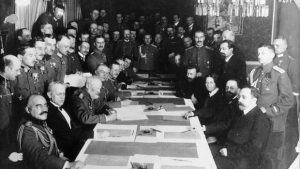
The end came on March 3, 1918, when Russia accepted peace terms that were even more harsh than those originally suggested by Germany. Russia would lose Poland, Lithuania, and the Baltic states of Estonia, Livonia, and Courland to Germany. To further devastate Russia’s hopes, Finland and the Ukraine saw Russia’s weakness as an opportunity to declare their independence. In all, Brest-Litovsk deprived Lenin’s new state of one million square miles of territory and one-third of its population, about 55 million people. Sometimes, it’s better to settle, rather than risk a loss far more devastating.

 My great grand niece, Izabella Siara Harman is a sassy little two year old…and that information comes straight from her mom. Belle as we all know her is the middle child of my grand nephew, Jake Harman and his wife, Melanie. She is the image of her daddy, and her mommy tells me that she is a sassy girl. At two, kids are learning to talk and repeating everything the adults around them are saying, and Belle is no different. In fact, it is the new words and phrases that she is saying these days that have totally convinced me that this is a sassy girls for sure. Belle’s latest sayings are things like please, thank you, no, sissy, and brother, of course, but then you get to the sassy things, like “are you kidding me,” “shut up,” and my favorite, “don’t freak out.” Yep, she’s a sassy girl!!
My great grand niece, Izabella Siara Harman is a sassy little two year old…and that information comes straight from her mom. Belle as we all know her is the middle child of my grand nephew, Jake Harman and his wife, Melanie. She is the image of her daddy, and her mommy tells me that she is a sassy girl. At two, kids are learning to talk and repeating everything the adults around them are saying, and Belle is no different. In fact, it is the new words and phrases that she is saying these days that have totally convinced me that this is a sassy girls for sure. Belle’s latest sayings are things like please, thank you, no, sissy, and brother, of course, but then you get to the sassy things, like “are you kidding me,” “shut up,” and my favorite, “don’t freak out.” Yep, she’s a sassy girl!!
This little girl is a girl after my own heart…and the hearts of her grandmother, Chantel Balcerzak, and her aunt, Jenny Spethman, because she loves shoes…all shoes. Now if you ask anyone who knows the three of us, they can tell you that we love shoes too…boots, sandals, tennis shoes, heels…shoes!!! That’s our little Belle to a tee. 
 For anyone who has ever loved shoes, Belle’s love of them seems perfectly normal. Seriously…this little girl could grow up to be a girly girl.
For anyone who has ever loved shoes, Belle’s love of them seems perfectly normal. Seriously…this little girl could grow up to be a girly girl.
Belle loves being a big sister, and she is very helpful to her mom, with her little brother, Jaxx. She feeds him his bottle, and gets him toys, and doesn’t even mind helping with diaper changing. I guess if you start a kid out early, they don’t get grossed out by stuff like that. Of course, Belle lets her big sister, Alice help too, when she gets home from school. Belle thinks Alice is a great big sister. They play together and they love to laugh, and be entertaining to their parents. There really is nothing like the laughter of children to get the whole house laughing. Belle and her siblings are great friends, and I know she can’t wait until Jaxx can get old enough to really play with her. It’s fun to take care of baby, but in the end, it’s lots more fun to run around the house and play with your little brother. I’m sure Jaxx feels the same way too. It’s hard for a baby to watch his older sisters running and playing, and all he can do is sit there getting excited. My guess is that Belle will be instrumental in 
 getting her brother up and crawling, and then walking…simply so he can keep up with the fun.
getting her brother up and crawling, and then walking…simply so he can keep up with the fun.
Belle is growing up so fast, and I love watching all the changes as she grows. She is a sweet little, feisty girl, who doesn’t give up on what she wants. She is sassy, indeed, but with an engaging twinkle in her large blue eyes. When she looks at you, you instantly love this little sweetie. It’s impossible not to. Today is Belle’s 2nd birthday. Happy birthday Belle!! Have a great day!! We love you!!

 As the youngest brother, sometimes it seems that my grand nephew, Isaac Spethman feels the need to be the wild, adventurous type. His big brothers always seem, to Isaac, to be ahead of him, which is, of course, normal because they are his older brothers. Nevertheless, to Isaac, saying that flag football isn’t as tough as regular football, feels like being called the baby. Isaac couldn’t wait to play football with the big boys. This was his first year of getting to do that, and he did great. He was so happy to be playing real football…finally!!
As the youngest brother, sometimes it seems that my grand nephew, Isaac Spethman feels the need to be the wild, adventurous type. His big brothers always seem, to Isaac, to be ahead of him, which is, of course, normal because they are his older brothers. Nevertheless, to Isaac, saying that flag football isn’t as tough as regular football, feels like being called the baby. Isaac couldn’t wait to play football with the big boys. This was his first year of getting to do that, and he did great. He was so happy to be playing real football…finally!!
Isaac’s wild side goes beyond football, however. Isaac love the feel of riding a motorcycle with his dad, Steve Spethman. As far as Isaac is concerned, faster is better. Riding is something Isaac can share with his daddy…when his mom isn’t riding with his dad anyway. Isaac gets along 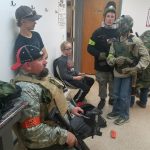
 well with all the guys. His brother, friends, and his dad and other relatives. He loves hanging out with the guys and playing airsoft wars. Of course, Isaac was raised around guns. He knows about guns…how to be safe with one, and how to shoot one…well. I suppose that skill would come in handy when playing a game called airsoft wars. Isaac and his brothers love all games that bring out their tough-guy side.
well with all the guys. His brother, friends, and his dad and other relatives. He loves hanging out with the guys and playing airsoft wars. Of course, Isaac was raised around guns. He knows about guns…how to be safe with one, and how to shoot one…well. I suppose that skill would come in handy when playing a game called airsoft wars. Isaac and his brothers love all games that bring out their tough-guy side.
While Isaac is a tough-guy, all boy kind of kid, he also has a softer side, although I don’t think he would admit that to just everyone. When it comes to helping a little mermaid named Aleesia down the dock, gentleman that he is, Isaac takes his little sister’s hand to make sure that she always gets safely to wherever it is that she is 
 headed. Aleesia is the baby of the family and the only girl, so her brothers take really good care of her, while letting her know that she is a little princess in their minds. Isaac, being the child closest to Aleesia in age, seems to understand what it’s like to be the little one, and he just instinctively takes his sister protectively by the hand. I’m sure it made Aleesia feel very safe. And really, what are big brothers for, after all. Today is Isaac’s eleventh birthday. I can’t believe that he is so grown up. Happy birthday Isaac!! Have a great day!! We love you!!
headed. Aleesia is the baby of the family and the only girl, so her brothers take really good care of her, while letting her know that she is a little princess in their minds. Isaac, being the child closest to Aleesia in age, seems to understand what it’s like to be the little one, and he just instinctively takes his sister protectively by the hand. I’m sure it made Aleesia feel very safe. And really, what are big brothers for, after all. Today is Isaac’s eleventh birthday. I can’t believe that he is so grown up. Happy birthday Isaac!! Have a great day!! We love you!!
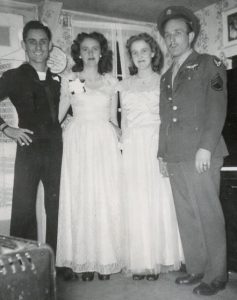 I always knew that my uncle, George Hushman served in the United States Navy during World War II, but like many of the men who fight in wars, discussing what happened during their deployment is something that few want to talk about. My family spent quite a bit of time with Uncle George and Aunt Evelyn, who was my mom’s sister, and their family, but in all those visits, I never heard my dad, Allen Spencer, or my Uncle George ever talk about their time in the war. In fact, had it not been for an old picture of the two couples going to the Military Ball, I don’t think I would have even known what branch of the military Uncle George was in.
I always knew that my uncle, George Hushman served in the United States Navy during World War II, but like many of the men who fight in wars, discussing what happened during their deployment is something that few want to talk about. My family spent quite a bit of time with Uncle George and Aunt Evelyn, who was my mom’s sister, and their family, but in all those visits, I never heard my dad, Allen Spencer, or my Uncle George ever talk about their time in the war. In fact, had it not been for an old picture of the two couples going to the Military Ball, I don’t think I would have even known what branch of the military Uncle George was in.
Recently, while researching my family history, I came across some Muster Rolls for the United States Navy, for one USS Gurke. The USS Gurke was a DD Type destroyer whose mission was to provide anti-submarine and anti-surface defense to other surface forces. The Gurke is one of 103 Gearing Class destroyers that were built at 8 different shipyards. It was originally laid down as USS John A. Bole in October of 1944, but was renamed USS Henry Gurke (DD-783) prior to her launching on February 15, 1945 at the Todd-Pacific Shipyards, Inc, in Tacoma, Washington. The ship’s sponsor was Mrs. Julius Gurke, mother of Private Gurke, for whom the ship was named. The destroyer was commissioned 12 May 1945, under the command of Commander 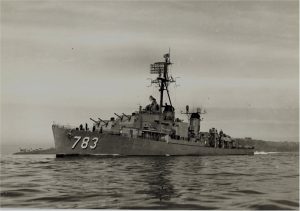 Kenneth Loveland. It was to this ship that my Uncle George was assigned beginning May 12, 1945. Prior to that he had been a S2c V6 on the USS LCI (G) 23, which was a transport ship.
Kenneth Loveland. It was to this ship that my Uncle George was assigned beginning May 12, 1945. Prior to that he had been a S2c V6 on the USS LCI (G) 23, which was a transport ship.
On the Gurke, Uncle George had a rating of S1c V6. I wasn’t sure what that meant, but I’m sure that any navy veteran would know. A V6 is a person who volunteered in World War II. As a V6 they had to be discharged by six months after the war was over. An S1c was a seamen first class. So now I knew what my uncle did during the war. Seaman first class was the rank right below a Petty Officer. The Seaman did a variety of jobs onboard the ship and could have worked anywhere on the ship. I suppose it would be a rank similar to the private, or in non-military verbiage, a laborer. That was the rank that many men went into the navy with, but a seaman first class was no longer a trainee. He had been trained to do his duties, and didn’t have to be told.
After a shakedown along the West Coast, the Gurke sailed for the Western Pacific August 27, 1945, reaching 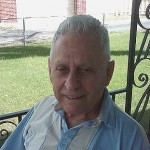 Pearl Harbor on September 2nd. From there she continued west to participate in the occupation of Japan and former Japanese possessions. Returning to home port of San Diego, in February 1946, the Gurke participated in training operations until September 4, 1947, when she sailed for another WestPac cruise. Two further WestPac cruises, alternating with operations out of San Diego, and a cruise to Alaska in 1948 aiding the celebration of the 50th anniversary of the Yukon gold rush, filled Gurke’s schedule until the outbreak of the Korean War. Of course, I assume that upon Gurke’s return to her home port of San Diego, my uncle was either assigned to another ship, was at home port, or discharged. I am very proud of his service. Today is Uncle George’s 93rd birthday. Happy birthday Uncle George!! Have a great day!! We love you!!
Pearl Harbor on September 2nd. From there she continued west to participate in the occupation of Japan and former Japanese possessions. Returning to home port of San Diego, in February 1946, the Gurke participated in training operations until September 4, 1947, when she sailed for another WestPac cruise. Two further WestPac cruises, alternating with operations out of San Diego, and a cruise to Alaska in 1948 aiding the celebration of the 50th anniversary of the Yukon gold rush, filled Gurke’s schedule until the outbreak of the Korean War. Of course, I assume that upon Gurke’s return to her home port of San Diego, my uncle was either assigned to another ship, was at home port, or discharged. I am very proud of his service. Today is Uncle George’s 93rd birthday. Happy birthday Uncle George!! Have a great day!! We love you!!

